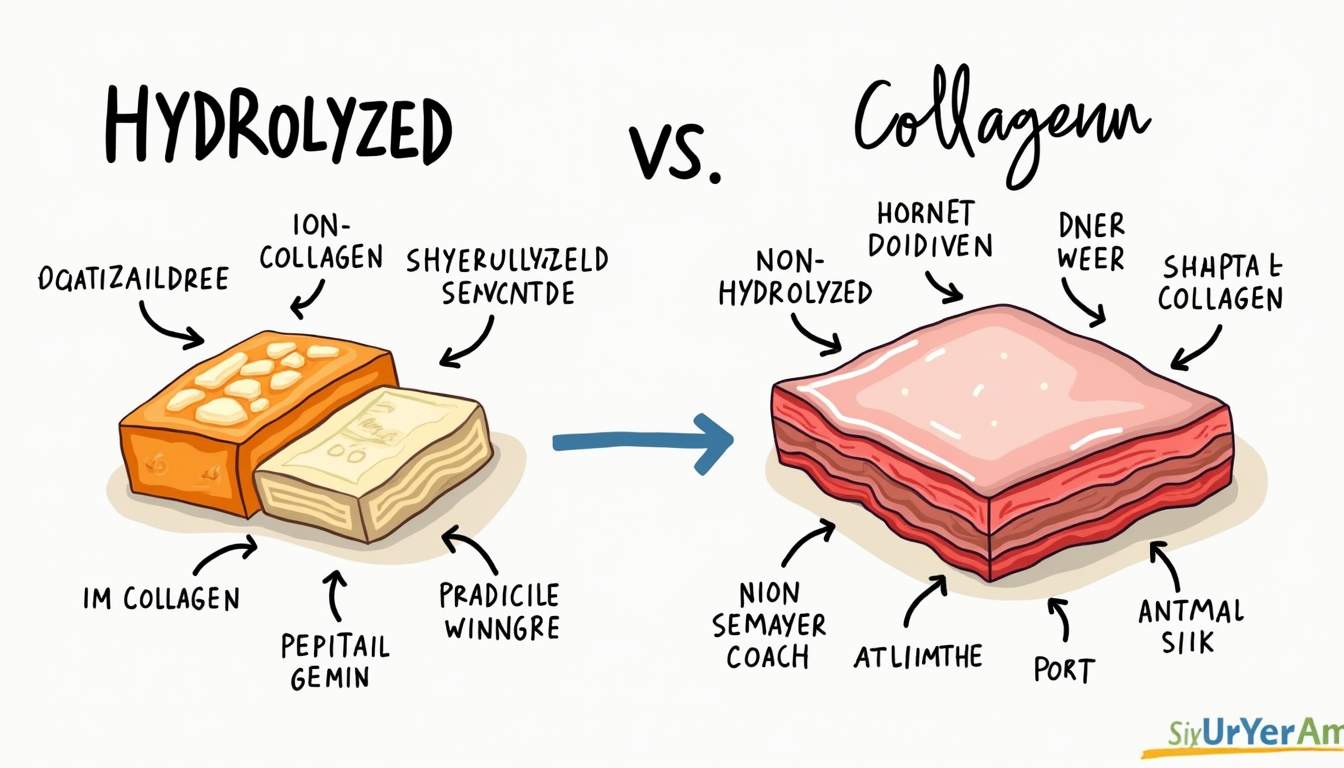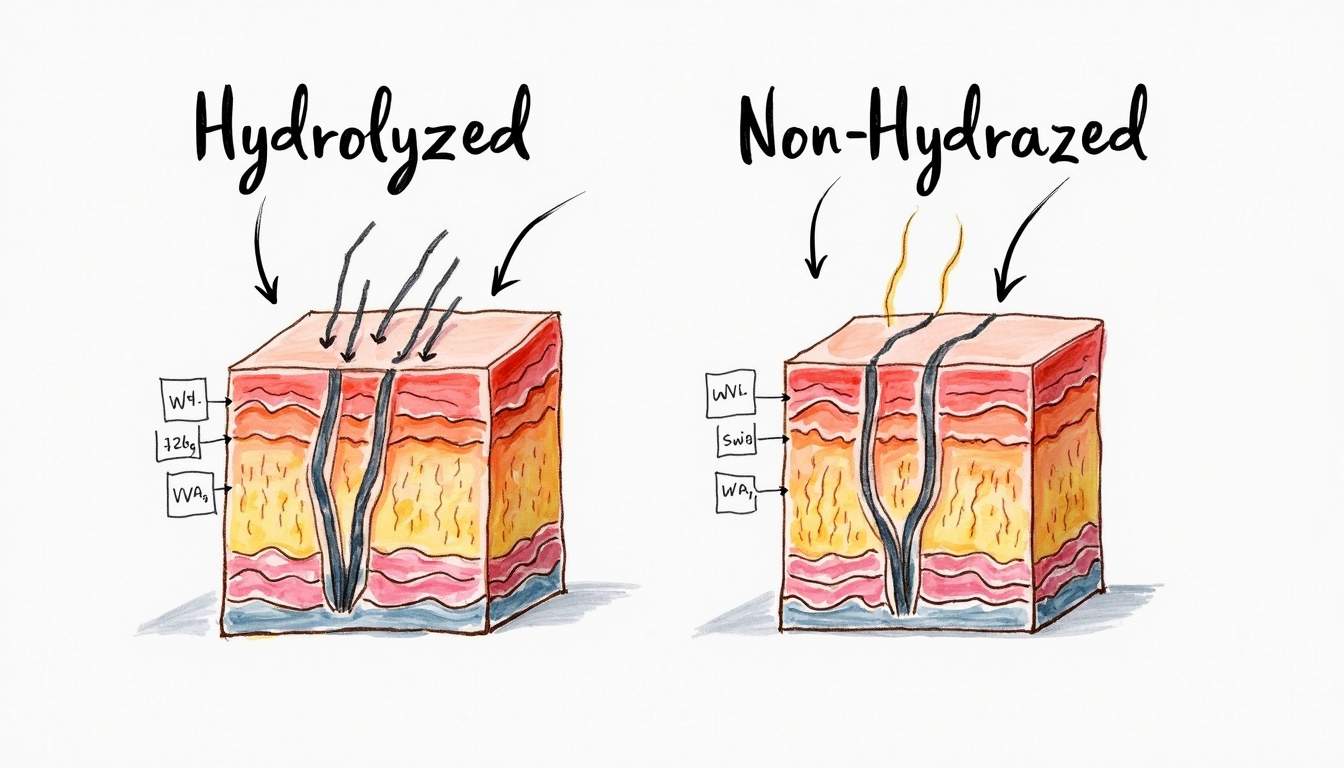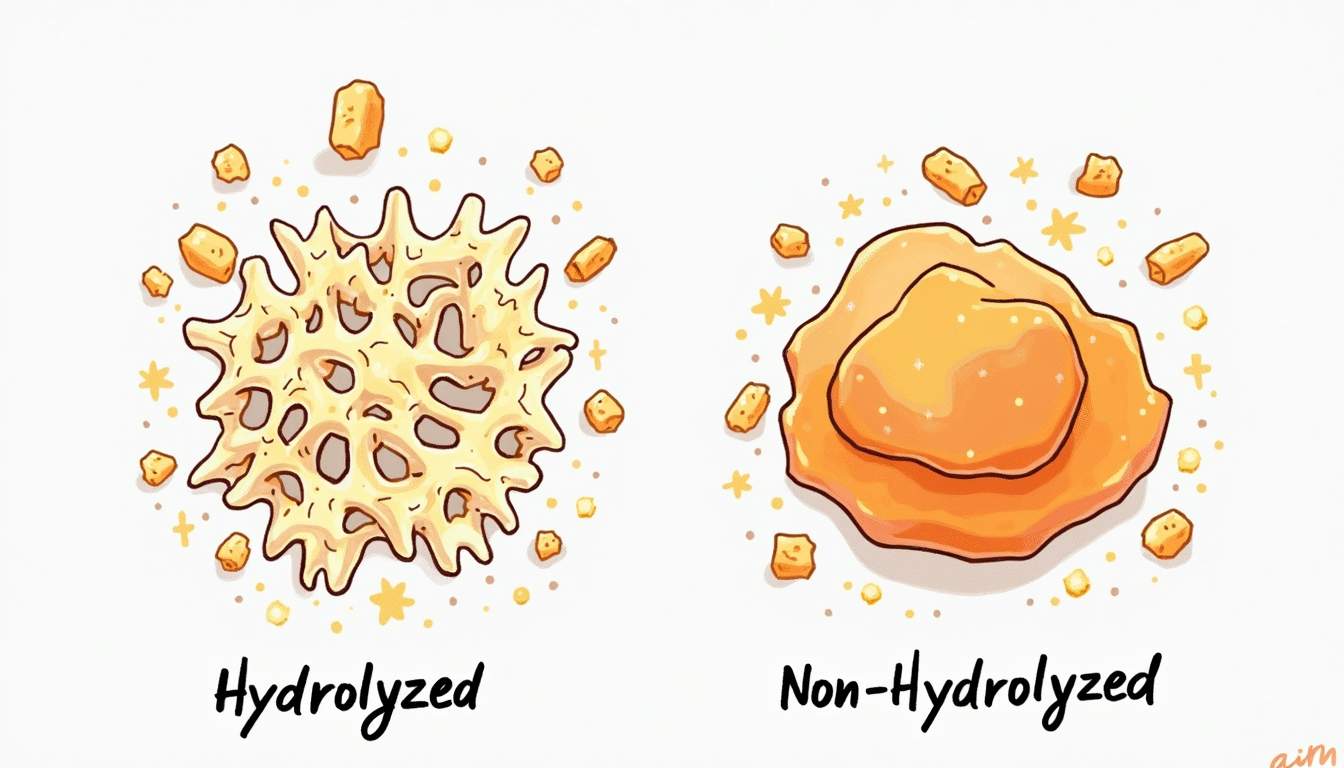Collagen has become a buzzword in the beauty and wellness industries, often touted for its potential to improve skin health, elasticity, and overall appearance. However, not all collagen supplements are created equal.
The debate between hydrolyzed and non-hydrolyzed collagen raises important questions about their effectiveness and benefits. This article delves into the differences between these two forms of collagen, helping you make an informed choice for your skin health.
What’s the difference between hydrolyzed and non-hydrolyzed collagen for skin health?
Hydrolyzed collagen (collagen peptides) is broken down into smaller peptides, making it easier for the body to absorb and use to improve skin hydration, elasticity, and reduce wrinkles. Non-hydrolyzed collagen has larger molecules and may not be absorbed as efficiently, making it less effective for skin support.
Understanding Collagen Types and Processing
Collagen is a protein that serves as a key structural component in the skin, bones, tendons, and other connective tissues. It is the most abundant protein in the human body, providing strength and elasticity. As we age, the natural production of collagen decreases, leading to visible signs of aging such as wrinkles and sagging skin. To combat these effects, collagen supplements have gained popularity, with hydrolyzed and non-hydrolyzed forms available on the market.

The Science Behind Hydrolyzed Collagen
Hydrolyzed collagen, also known as collagen peptides, is created through a process called hydrolysis. This process involves breaking down the collagen molecules into smaller peptides, making them easier for the body to absorb. The result is a powder or liquid supplement that can be easily mixed into beverages or foods.
The smaller peptide size of hydrolyzed collagen allows for quicker absorption in the digestive system. This means that the body can utilize the amino acids more efficiently, potentially leading to faster results in terms of skin health and elasticity. Additionally, hydrolyzed collagen is often tasteless and odorless, making it a convenient addition to daily routines.
Recent studies have suggested that regular consumption of hydrolyzed collagen may stimulate the body's own collagen production, enhancing skin hydration and reducing the appearance of fine lines. This has made it a favored choice among beauty enthusiasts and health-conscious individuals alike.
Non-Hydrolyzed Collagen: Structure and Properties
Non-hydrolyzed collagen, on the other hand, retains its larger molecular structure. This form of collagen is often found in products like gelatin, which is derived from collagen but has not undergone the hydrolysis process. While non-hydrolyzed collagen can still provide benefits, its larger molecules may hinder absorption in the digestive tract.
Non-hydrolyzed collagen is typically used in cooking and baking, where it can provide texture and stability to foods. However, its effectiveness as a supplement for skin health may be limited compared to hydrolyzed collagen. The body may struggle to break down these larger molecules, resulting in lower bioavailability and potentially less impact on skin health.
Interestingly, non-hydrolyzed collagen has been shown to support joint health and may play a role in improving the strength of cartilage, making it a valuable addition to diets focused on athletic performance and recovery. Moreover, its gelling properties make it a popular ingredient in various culinary applications, from desserts to savory dishes, allowing consumers to enjoy its benefits while indulging in their favorite recipes.
Which Type of Collagen Works Best for Skin Health?
When it comes to skin health, the effectiveness of collagen supplements is a primary concern for consumers. Understanding the differences in absorption and clinical evidence can help clarify which form may be more beneficial.

Absorption and Bioavailability Differences
As mentioned earlier, hydrolyzed collagen's smaller peptides allow for better absorption in the digestive system. Studies have shown that hydrolyzed collagen can significantly increase collagen levels in the skin and improve skin hydration, elasticity, and overall appearance.
The rapid absorption means that the amino acids can quickly reach the dermal layers of the skin, where they can stimulate collagen production and repair.
In contrast, non-hydrolyzed collagen's larger molecules may not be absorbed as efficiently. Research indicates that while some benefits may still be observed, the impact on skin health may not be as pronounced as with hydrolyzed collagen. This difference in bioavailability is a crucial factor for those seeking effective solutions for skin aging and health.
Additionally, the method of consumption can also influence absorption rates; for instance, collagen supplements taken on an empty stomach may be absorbed more effectively than when consumed with meals, which could further enhance their benefits.
Clinical Evidence and Research Findings
Numerous studies have been conducted to evaluate the effects of collagen supplementation on skin health. Research focusing on hydrolyzed collagen has yielded promising results, with many participants reporting improvements in skin elasticity, hydration, and wrinkle depth after consistent use. For example, a study published in the journal "Skin Pharmacology and Physiology" found that women who consumed hydrolyzed collagen experienced a significant increase in skin elasticity after eight weeks.
Furthermore, another study highlighted that participants who took hydrolyzed collagen showed a marked reduction in the appearance of fine lines and wrinkles, suggesting that these supplements may play a vital role in maintaining youthful skin.
On the other hand, research on non-hydrolyzed collagen is less extensive, and while some studies suggest potential benefits, the evidence is not as robust. The lack of significant clinical findings related to non-hydrolyzed collagen's impact on skin health raises questions about its effectiveness compared to hydrolyzed forms. Moreover, the varying sources of collagen—such as bovine, porcine, or marine—can also affect the outcomes, as each source may contain different amino acid profiles that could influence skin health differently.
Understanding these nuances can empower consumers to make informed choices about which collagen supplements may best suit their individual skin health needs.
Making the Right Choice for Your Skin
Choosing between hydrolyzed and non-hydrolyzed collagen ultimately depends on individual skin concerns and goals. Understanding specific skin issues can guide consumers in selecting the most suitable option.
Identifying Your Specific Skin Concerns
Before deciding on a collagen supplement, it's essential to identify your skin concerns. Are you looking to improve hydration, reduce fine lines, or enhance overall skin texture?
Hydrolyzed collagen may be the better choice for those seeking rapid and noticeable improvements in skin health. Its high bioavailability allows for targeted support where it is needed most.
Conversely, individuals who are primarily interested in the culinary uses of collagen may find non-hydrolyzed collagen more appealing. It can be a versatile ingredient in recipes, providing health benefits while enhancing the texture of various dishes.
For example, adding non-hydrolyzed collagen to soups or stews not only enriches the meal but also contributes to your daily protein intake, making it an excellent choice for those looking to bolster their nutrition while enjoying flavorful meals.
How to Use Collagen in Your Skincare and Diet
Integrating collagen supplements into a skincare routine can be straightforward. Hydrolyzed collagen can be added to smoothies, coffee, or even baked goods, making it easy to incorporate into daily life. For those who prefer topical applications, collagen-infused creams and serums can complement oral supplementation, providing additional support for skin health.
Many skincare brands are now formulating products that combine collagen with other beneficial ingredients, such as hyaluronic acid and peptides, to maximize hydration and elasticity.
It is also advisable to combine collagen supplementation with a balanced diet rich in vitamins and minerals that support skin health, such as vitamin C, zinc, and omega-3 fatty acids. This holistic approach can enhance the effectiveness of collagen and promote overall skin vitality.
Additionally, lifestyle factors such as adequate hydration, sun protection, and regular exercise play crucial roles in maintaining skin health. By adopting a comprehensive skincare regimen that includes these elements, individuals can create a robust foundation for achieving radiant and youthful skin.
While both hydrolyzed and non-hydrolyzed collagen have their merits, hydrolyzed collagen appears to be the superior choice for those specifically targeting skin health. Its enhanced absorption and clinical backing make it a popular option for individuals looking to improve their skin's appearance and resilience.
By understanding the differences and aligning choices with personal skin goals, individuals can make informed decisions that best support their skin health journey.
Improve Your Skin Naturally with Hydrolyzed Collagen
If you're looking to support skin elasticity, hydration, and reduce wrinkles, our Hydrolyzed Collagen Peptides are a perfect addition to your routine.
-
10g collagen peptides per serving
-
Clinically supported for skin, hair, nails, and joints
-
Mixes easily into coffee, smoothies, or water

Share:
Lion’s Mane for Focus and Brain Fog: How It Works, Dosage, and Scientific Benefits
Does Collagen Help Joint Pain and Inflammation? What the Science Says